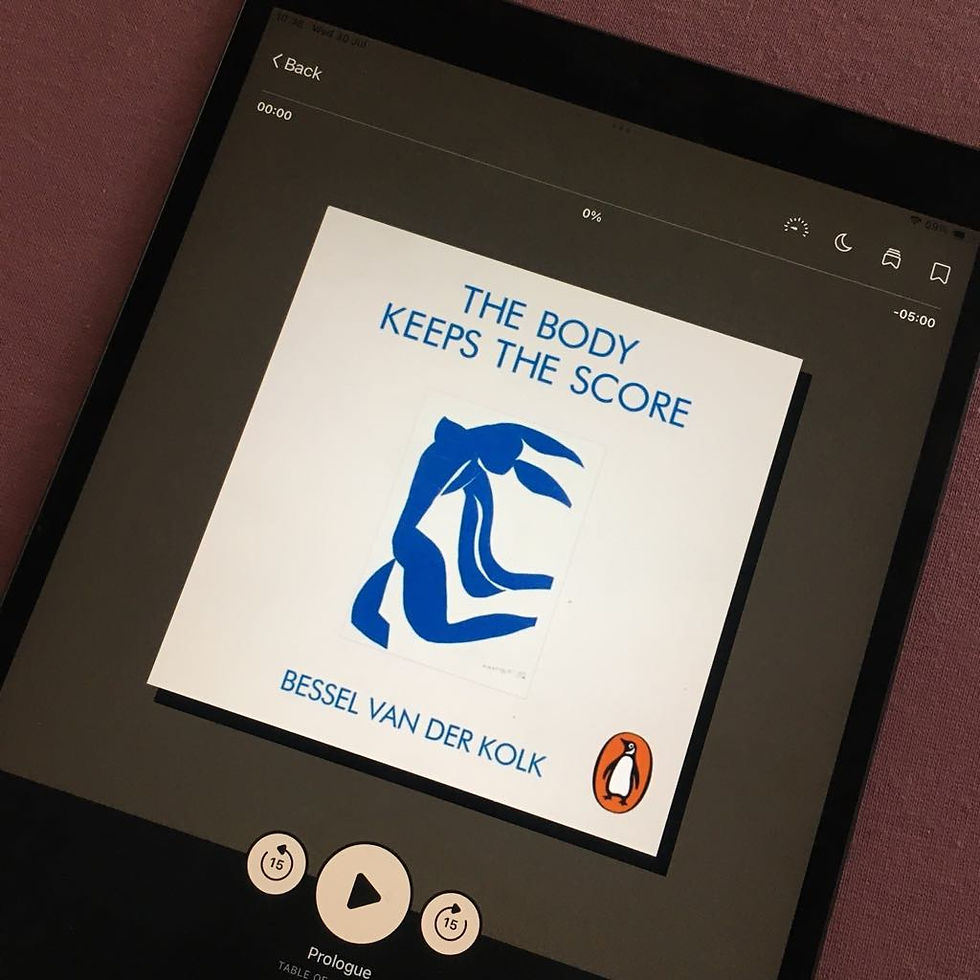The psychiatrist and the body
- Sylvia

- 3 days ago
- 5 min read
I promised in my previous post to share with you some of Bessel van der Kolk's wisdom.
In case you don't know him, you might have heard of his bestselling book The Body Keeps the Score?

Bessel is a renowned psychiatrist and trauma expert who has shifted the conversation around trauma from purely psychological to deeply embodied.
What I find most significant is that he, unlike many practitioners who work from the head upwards, i.e. cognitively, validates the importance of somatic practices, body awareness and movement in recovering from trauma.
And if you now think – as I did many years ago – this is of no interest to me as I've never experienced trauma, I want to encourage you to read on, there's loads to discover and this might be an eye-opener for you, as it was for me.
As Dr Gabor Mate – and he's is another expert on the mind-body connection as well as trauma – says:
“There are two kinds of people in the world. Those who know they were traumatised and those who where traumatised and don't know it.”
Anyway, back to Bessel van der Kolk.
His central message is that trauma lives in the body, and healing must engage the body, not just the mind.
So he goes beyond talking therapies and urges to include body-based approaches.
Great to hear that from a psychiatrist.
And here are some of the most fascinating notes I took during one of Bessel's lectures:
He said:
"My book is called The Body Keeps the Score, because the body keeps the score.
In my book I wrote about the obvious.
If your brain gets stuck in fear or flight, you need to help people to live in a body that feels safe so you can change your brain to be open to new experiences.
It's becoming increasingly obvious to me that psychotherapists have a very small segment of capacity of what they can do for people. And that maybe yoga teachers, body workers, choral conductors, martial arts instructors … may have at least as much to offer as we do.
Very few psychotherapists are trained to work with the body.
Psychotherapists think it's all about talking and explaining and understanding, but that may not be the most critical part of overcoming trauma.
The most important thing may be to learn to experience new things on a physical level.
Trauma gets lived out not as stories, not as events, but in the body, in terms of bodily sensations, feeling it in your chest, in your abdomen, that feels really bad. And you don't think 'oh, that is about my incest that happened 30 years ago.'
Psychotherapy only addresses a very narrow spectrum of problems, but if you have fibromyalgia* someone needs to work with your bodily sensations and help your body to feel calm.
When people talk about their trauma, it doesn't necessarily go away.
I so enjoy listening to Bessel van der Kolk as I know for sure that many in his profession totally pooh-pooh any kind of somatic involvement.
And I find this sad, as it's certainly not supporting their clients as effectively as it could.
As always, I also want to make clear that I'm not saying that it's one of the other, not at all, that would be wrong and also unhelpful.
To me it's about choice – we are all unique and we have different preferences and approaches, so I encourage you to do your research and choose the approach that resonates best with you. And if this particular one doesn't work, try something else.
Only you know, what's best for you, try and listen to your body, your gut feeling. I strongly believe that your body knows it deep, deep down.
Furthermore, it's about modalities complementing each other – therapists working together in order to support their clients in the best possible and suitable way.
There are two more things I learned in my initial training and in many CPD (Continued Professional Development) sessions:
The first is, that we've all experienced trauma at some stage in our lives.
Trauma isn't 'just' about big T trauma, the truly awful things that are often universally acknowledged as traumatic.
No, trauma can also be small t trauma, events that are – thankfully – not the big and horrendous ones, but can still have a huge effect on our lives, our health and how we see the world.
Maybe they happened in early childhood and you can't remember a thing, or they were hurtful, but you decided to forget them, to suppress everything.
This is where psychosomatic pain comes in:
Perhaps you just brushed it off as 'well, that's normal, that's just life.'
So you tell yourself to 'hold yourself together' – and then wonder why your back is playing up or why it feels like the weight of the world is on your shoulders.
Or you keep a stiff upper lip – and your dentist is concerned about your teeth as you are teeth grinding and holding a lot of tension in your jaw.
Maybe you suppress anger, emotions, your true self – which can lead to depression.
Or your digestive system is bothering you – which can be a sign of dysregulation in the gut-brain axis.
The brain-gut connection is a two-way communication system between your brain and your gut and shows clearly how emotional stress can influence digestion and how gut imbalances can affect mood. So when one part struggles, the other often does too.
The second is that movement heals (almost) all wounds.
Many years ago I heard an NLP coach saying that he had a client enquiry from somebody who said they were depressed.
He told them to go away and for one week do everything at a faster pace, e.g. moving through their day more quickly, speeding up their usual routines, even talking faster and walking faster.
After a week this client came back and said they felt so much better and doesn't need coaching anymore.
Initially I thought that's quite a brutal recommendation and yes, it might be over-simplified, but there is certainly some truth in it as movement is key.
Movement is healing because:
it helps regulate and release built-up stress and tension in the body
it's a rhythmic way to activate systems in the brain and nervous system that support emotional balance, mental clarity and physical well-being.
Movement can release stress hormones and produce endorphins, which are natural mood boosters, it supports the nervous system and is connecting us to the body, it is grounding and can boost overall health.
It isn't just physical – it's emotional and neurological.
And this is were the mind-body connection comes in
Does this all make sense to you?
I invite you to get in touch if you'd like me to clarify anything.
Otherwise, I'd simply say: the proof is in the pudding.
I can see a huge difference in myself since TRE entered my life and I hear it from my clients, too.
Natural. Innate. TREmendous
* fibromyalgia is what Bessel mentioned as an example, but it can apply to a range of psychosomatic symptoms.
I'll always remember my client who presented with fibromyalgia; after their TRE sessions they felt pain-free for many hours - and have learned a tool they can always apply to support themselves.



Comentarios